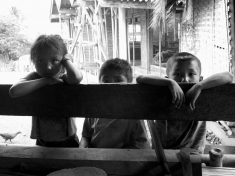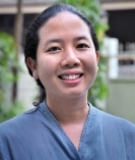A River of Memories
A group of elderly women were carefully preparing flowers to offer to the Buddha image. Outside, a dozen villagers were busy cooking a variety of dishes. A ceremony was being held in memory of a late monk who garnered respect from the villagers of Ban Na To Yai village in northern Laos. The preparations were done with utmost care for this important event. The only thing missing was the temple where villagers would normally go pay their respects.
“When we were relocated here, they did not build us a temple,” said an elderly man while staring blankly at the rugged dirt road ahead, which was flanked by new homes built by the company building a huge new dam on the Mekong.
Ban Na To Yai houses villagers from a village that used to be by the Mekong River but no longer exists, as it has been turned over to the Xayaburi Dam, the first of a series dams planned for construction on the lower stretch the Mekong in Xayaburi Province in Laos.
Before the dam’s first concrete piling was built in the Mekong three years ago, we had a chance to travel down the river. It was a very an intimate experience. At nightfall, we slept on a sandy beach. One morning, while sailing through Kaeng Luang, the largest rapid on this stretch, we pulled over at Ban Huay Sui, the first village slated to be relocated, and started our documentation there.
A young couple were getting married that day. The whole village was gathered at the houses of the bride’s and groom’s families. A procession was made with simple songs and dances leading toward the bride’s house. Everyone’s faces were lit with smiles.
“We really had no idea before the dam’s construction started what would happen to us. We did not know where we would be moved to,” said one villager in a subdued voice. Within a year, their homes no longer existed.
The joyous atmosphere at the wedding became a nostalgic memory of the village that cannot be brought back, of a community in limbo.
We had no idea what lay ahead for the newlyweds, starting their new lives together and yet with such an uncertain future. What was clear was that their families would no longer live together in the new resettlement. We were able to speak with them when we visited them again at their new settlement.
“We have no income since moving here. The land here is not good for rice farming. Fish culture was provided initially, but there is no more fish now. Water here is rusty. Women stay home with no chance to fish and pan for gold. If we were still at our old village, we would have simply walked into the river panning for gold and catching fish, just enough to live by,” said one middle-aged woman. “I really, really miss the Mekong,” she said with a sigh.
The Xayaburi Dam is one of the largest dam sites in the region. A gigantic section of the Mekong has been filled in, leaving just a tiny channel. Looking at the dam site now, we can no longer tell where the villages were. In the next year the whole section of the Mekong will be blocked.
This is my fourteenth year working on transboundary river issues facing the Mekong. Xayaburi Dam is definitely not the first nor the last symbol of tragedy resulting from unfair development, made at the expense of powerless people and the environment. Decisions are being made by a handful of powerful figures in government and in the construction and energy industries. Local people barely have any role in the planning and decision-making.
The Mekong, the Salween and all other major rivers in the region are the hubs of rich natural resources, a major source of natural capital. All of the flowing waters belong to our descendants for generations to come. It is our obligation to protect them from harm, so that local communities in the region will continue to benefit from them. Any large-scale development projects that will hurt our rivers must be decided collectively. The process must be transparent and the local people must be allowed to take part in the decision-making. Anything less is an unjust theft of our natural birthright.
I am proud of being a part of the environmental movement in Thailand, and a part of International Rivers’ stalwart campaign to protect this river, my heritage. We will continue to speak out for Mother Mekong as long as it takes.




